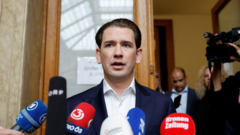Sebastian Kurz, Austria's former chancellor, has successfully had his conviction for perjury overturned, raising questions about his future political intentions amid ongoing corruption investigations.
Ex-Chancellor Sebastian Kurz's Perjury Conviction Overturned

Ex-Chancellor Sebastian Kurz's Perjury Conviction Overturned
Sebastian Kurz's appeal successful, potentially paving the way for his political return in Austria.
Austria's former chancellor, Sebastian Kurz, is celebrating a significant legal victory after an appeal against his conviction for perjury was upheld by a court. The verdict overturns a previous ruling that had sentenced him to an eight-month suspended sentence for allegedly providing false testimony to a parliamentary committee. Kurz, once regarded as a rising star among European conservatives, resigned from his chancellorship in 2021 amidst mounting allegations and scrutiny.
The case against Kurz revolved around accusations that he had overstepped his boundaries in selecting executives for a state holding company during his time in office, contrary to his claims of merely being informed of such decisions. During a parliamentary inquiry in 2020, he stated, “I was involved in the sense of informed,” a statement the initial trial judge deemed false. However, in his appeal, Kurz contended that the original judge demonstrated bias, which the appellate bench of three judges ultimately accepted. Their judgement noted that the criteria for establishing false testimony were not met, leading to his acquittal.
Addressing the media following the court's decision, Kurz expressed relief at the outcome, stating, “The years of accusations against me have now all collapsed.” Despite his recent legal triumph, he remains embroiled in separate corruption allegations concerning the misuse of public funds for favorable media optics and polls that inflated his popularity. The decision from prosecutors on whether to formally charge him over these allegations is still pending.
Since his political exit, Kurz has explored various business endeavors, including co-founding the cybersecurity firm Dream in 2023, alongside former executives from companies involved in controversial surveillance technologies. Notably, he had previously led the conservative Austrian People's Party, guiding them to electoral success in 2017 and 2019 through a stringent immigration policy.
Currently, Austria’s political landscape is shaped by a coalition led by the People's Party, alongside the Social Democrats and a liberal party, following the August elections. The far-right Freedom Party gained significant traction in this vote, reflecting public dissatisfaction surrounding economic and migration issues, although they did not manage to form a government.




















